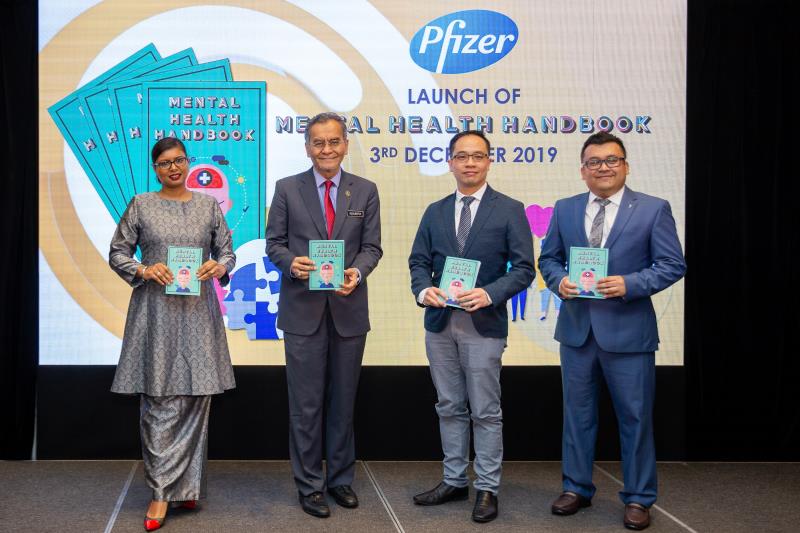 L-R: Dr Jerusha Naidoo, Datuk Seri Dr Dzulkefly Ahmad, Associate Professor Dr Ng Chong Guan, and Dr Hazli Zakaria.
L-R: Dr Jerusha Naidoo, Datuk Seri Dr Dzulkefly Ahmad, Associate Professor Dr Ng Chong Guan, and Dr Hazli Zakaria.The Malaysian Psychiatric Association (MPA), Malaysian Mental Health Association (MMHA) and Pfizer Malaysia jointly launched a new mental health handbook in December 2019 to highlight the signs and symptoms of mental health issues and encourage Malaysians to see a doctor early if they experience any signs or symptoms.
“Mental health literacy is crucial in helping to identify early warning signs and symptoms, treating and managing mental disorders,” said Datuk Seri Dr Dzulkefly Ahmad, Minister of Health Malaysia, during the launch.
“Mental health problems affect 1-in-3 Malaysians and validated knowledge for the community is one of the most important steps to promote greater understanding of mental health issues. The Mental Health Handbook, which is jointly developed through a private-public partnership, provides an invaluable and credible resource guide to help Malaysians deal with mental health issues,” he added. [National Health and Morbidity Survey 2015. Available at http://www.moh.gov.my/moh/resources/nhmsreport2015vol2.pdf]
The handbook consists of well-defined sections on four mental issues including depression, anxiety, bipolar disorder, and schizophrenia. It is a useful resource for everyone as they can refer to information on how to communicate effectively with their loved ones as well as a list of mental health services in Malaysia where they can obtain professional help. In addition, the handbook also highlights steps to manage one’s mental well-being. The handbook will be distributed to universities, patients and communities in digital format and can be downloaded from: https://www.myhealthmylife.com.my/.
“Understanding the barriers to the help-seeking methods among Malaysians is an important step towards facilitating prompt access to mental health services and improving psychological well-being,” said Dr Hazli Zakaria, president of MPA.
“It is important to know that mental illness is treatable. Mental disorders encompass a broad range of problems with different symptoms. One of the key chapters in the handbook discusses how to recognize early warning signs and symptoms of mental illness and when to seek professional help,” he added.
Based on the 2019 research survey conducted by MPA, about half of the respondents (50.7 percent) preferred talking to a friend about their mental health issues, while internet search is the second ranked choice. Among the youths, more than half (65 percent) of them surveyed would likely use a smartphone application to seek for information on mental health too.
However, more than eight out of 10 (85 percent) are worried that seeking mental healthcare may affect their career prospects, while one in every two (52 percent) are deeply concerned about the negative reaction from family and friends. More than two thirds (67 percent) are embarrassed to seek help. A total of 276 respondents were randomly surveyed in a web-based questionnaire during a period from 5 August 2019 to 18 September 2019.
“It is pertinent for colleges and universities to educate students on how to identify signs and symptoms of mental disorders and offer help. It is also vital to build positive mental well-being and emotional resilience in adolescents and equip them with effective coping techniques to deal with daily challenges and mental stress,” said Associate Professor Dr Ng Chong Guan, deputy president of MMHA.
He also pointed out that early intervention is crucial for young people as the National Health and Morbidity Survey in 2017 reported that suicidal thoughts among teenagers aged 13 to 17 have increased from 7.9 percent in 2012 to 10 percent in 2017. [Available at https://www.researchgate.net/publication/331033418]
“Families, friends and colleagues are often the real first responders to encounter someone suffering from mental illness. As such, we must educate individuals and communities with the right knowledge, skills and support on how to start a conversation with those struggling with mental illness,” said Dr Jerusha Naidoo, country medical director, Pfizer Malaysia.
Improved access to mental health resources, strong peer support and professional guidance will empower more Malaysians to come forward and seek treatment early, she said.